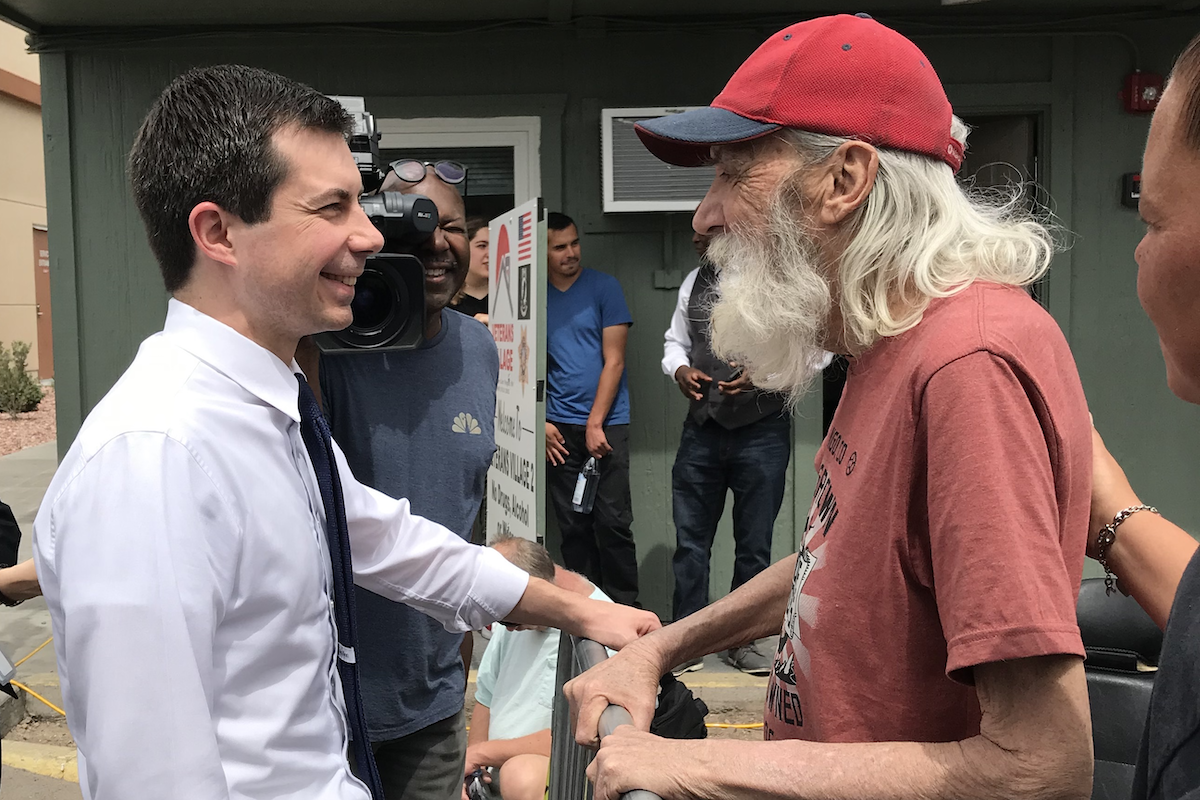

Pete Buttigieg talking with a veteran on Monday, April 8, 2019 in Las Vegas. (Photo by Hector Luis Alamo/Latino Rebels)
LAS VEGAS — Pete Buttigieg is shaking hands with one of the more ancient and war-worn inhabitants of Veterans Village II on the wretched east end of Downtown Las Vegas. When he saw Pete climb out the back of a big shiny black Cadillac SUV a few minutes earlier, the old soldier had wondered aloud, “Must be a senator or something.” Someone told him that the kid in the white dress shirt and blue tie is the mayor of South Bend, Indiana, and is thinking about moving to the White House. (Mayor Pete hasn’t said for sure whether he’s running or not, saving the “special announcement” for an event in South Bend this upcoming Sunday.)
“Ooohhh,” the old man said. “John Fogerty was here earlier!”
Now the old man, sitting in his rollator, is shaking hands and giving Mayor Pete a big wrinkly grin. “Yeah, good, I voted for you!” Mayor Pete, hunched over him and blushing, pats the old man on the shoulder and walks away.
Veterans Village is the handiwork of Dr. Arnold Stalk and an exhausted staff. They give otherwise homeless veterans a place to rest their weary heads. The place looks like the crummy apartment complexes where the poor Black and Latino kids lived in the Chicago suburb I grew up in, its parking lot cracked and depressed. This used to be an abandoned Econo Lodge motel before the veterans moved in. A few construction workers are buzzing away on one of several small shipping containers being repurposed into studio apartments.
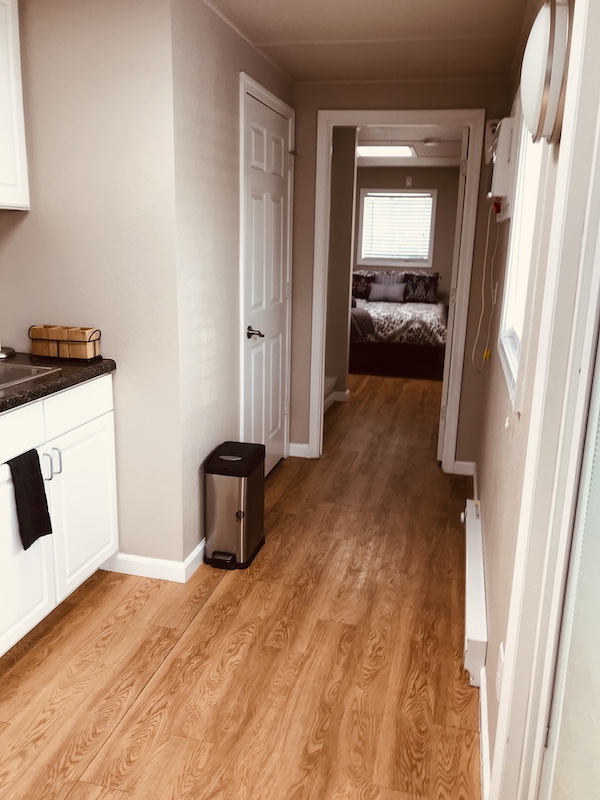

Inside one of the Veterans Villages II apartments (Photo by Hector Luis Alamo/Latino Rebels)
Mayor Pete was given the grand tour of a model unit by the front gate, painted in a trendy gray-brown with white trim. The inside has a tiny kitchen separating a tiny sleeping area at the back and a tiny living room at the front; clean and tidy, it reminds me of the cramped affordable housing units being built on the outskirts of Juárez. A woman wearing one of the Veterans Village shirts that all the staff members wear points toward an empty lot behind a building by the back entrance, where the finished units will be set.
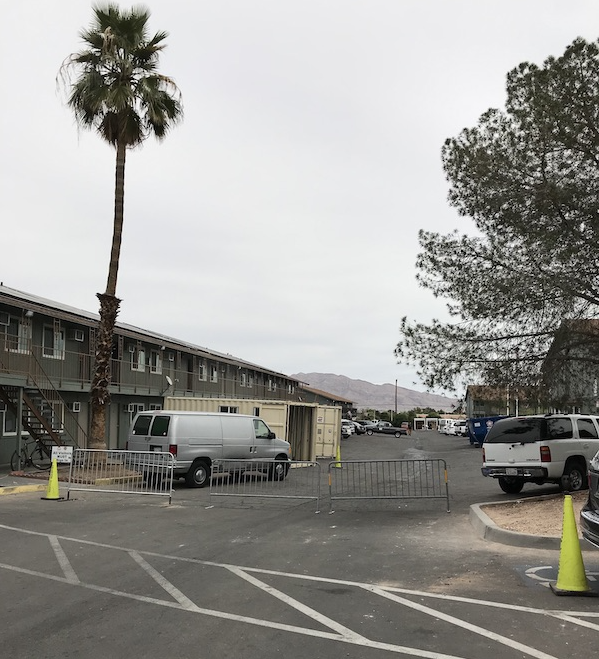

Outside Veterans Village II (Photo by Hector Luis Alamo/Latino Rebels)
Arnold Stalk and the staff also organize a food pantry every Monday, Wednesday and Friday. “Sometimes more,” says the big-bellied man sitting in a chair at the main gate and checking people in from the neighborhood, mostly older single men and mothers with their kids. He records their names, the number of people in their families, and whether they’re collecting food stamps or not; the State of Nevada will come by every so often to make sure they’re actually distributing the food to people in need. “We get Starbucks food seven times a week,” he says.
Since Mayor Pete is visiting on a Monday, there are two palettes at the front of the complex, one stacked with cans of diced tomatoes and cut green beans, the other with bags of lentil beans. Folding tables wrap around a little courtyard in front of the main building, and veterans and the people from beyond the gates line up to pick from a pretty wide selection of bread, buns, frozen burger patties and pork fillets, pre-packaged salads and sushi, veggies, bananas, bags of potatoes and Brussels sprouts, muffins, cookies, stuff like that.
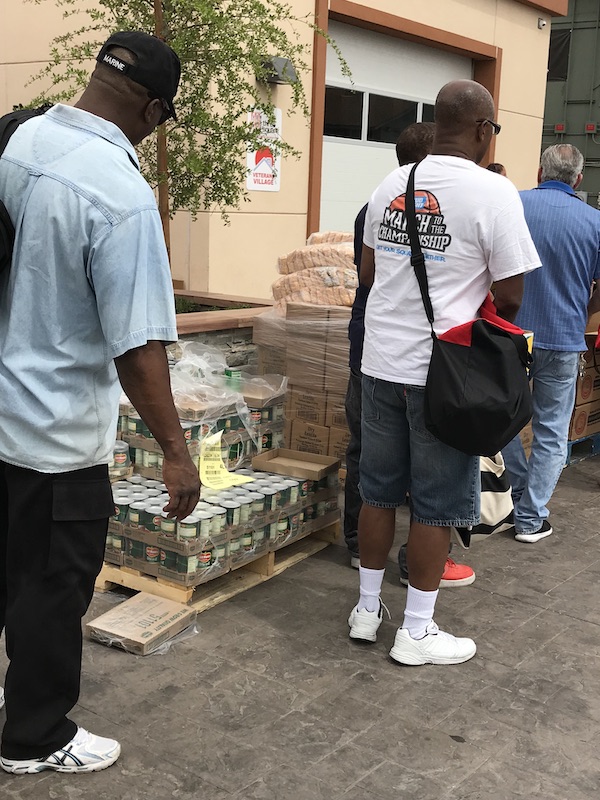

Some of the palettes at Veterans Village (Photo by Hector Luis Alamo/Latino Rebels)
“You better grab some water,” one hefty lady in slippers tells another hefty lady in slides. “You’ll need it. You never know when they’ll shut ours off. The other day I was pleading, ‘Please don’t shut my water off!'” She laughs about it.
The people lined up bring all kinds of containers to haul away their swag—grocery carts, canvas bags, backpacks, old cardboard fruit boxes, laundry baskets, even a carry-on luggage bag with wheels. In the center of the little courtyard, two chairs and a table are set up where Mayor Pete is set to film an interview with CNBC’s chief Washington correspondent, John Harwood. A few bulky TV cameras stand on tripods around facing the table, planning to film Mayor Pete and Harwood chatting over a lunch of flatbread sandwiches and chips while poor people are being fed in the background.
Dr. Stalk, as some of the staff call him, is a gruff, no-nonsense kind of guy. He has thick forearms, the body of a pickup truck, greying short black hair, and his eyes mean business. He looks like he could snap my neck between his fingertips and thumb with a quick twist of his wrist.
“I started Veterans Village because I cannot think of a single reason that the words ‘United States Veterans,’ ‘homelessness’ and ‘poverty’ should ever be used in the same sentence,” he told a local magazine.
Arnie, as some of the veterans call him, prides himself on the fact that Veterans Village isn’t tied to a government agency or any other organization. When I say it’s a shame he isn’t getting government grants, Arnie goes, “We don’t want ’em.” Arnie hates “red-tape” and “bureaucracies.” They’re “cumbersome,” he says, and “get in the way of what we’re trying to do.”
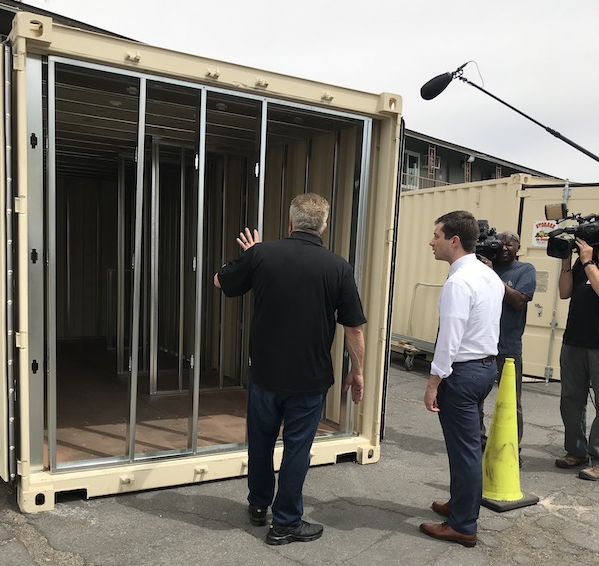

Mayor Pete getting a tour of a Veterans Village shipping container (Photo by Hector Luis Alamo/Latino Rebels)
Arnie’s own father was a veteran of the Second World War, and he himself has served his country in other ways: on the Board of Trustees of Habitat for Humanity, United Way of Southern Nevada, the American Red Cross of Southern Nevada, and on the advisory boards of 100 Black Men of Las Vegas and The Rape Crisis Center. Veterans Village even has its own crisis intervention program, available 24 hours a day. Veterans Village II is the second of nine locations in Las Vegas—when I mistakenly showed up at Veterans Village I on Las Vegas Boulevard, the black woman in charge, who was busy moving stuff around and directing other staff members, sighed and handed me a pamphlet with the address to Veterans Village II, just off Fremont Street. Dr. Arnie Stalk wants to open other Veterans Villages around the Valley, and hopes his work becomes a model for helping veterans nationwide, “city by city, county by county and state by state.”
Earlier in the Morning
In the morning Mayor Pete had held a meet-and-greet at a trendy café on the opposite side of town. The Madhouse Coffee is a 24-hour café that brews the Intelligentsia brand of artisanal coffee. It’s described as an “upbeat canteen for elegant sandwiches & salads,” and their menu boasts The Impossible Burger (“100% plant based, best burger we ever tasted”), a vegan chicken sandwich called The Hickster, an actual chicken sandwich (this one with chipotle mayo) named after Bukowski’s literary alter-ego, a sriracha-laced sandwich with four kinds of grilled cheese called Cheesus Christ, and a turkey sandwich topped with bacon and guac dubbed The Green Card. It also serves French macarons and passion fruit tea, among other treats.
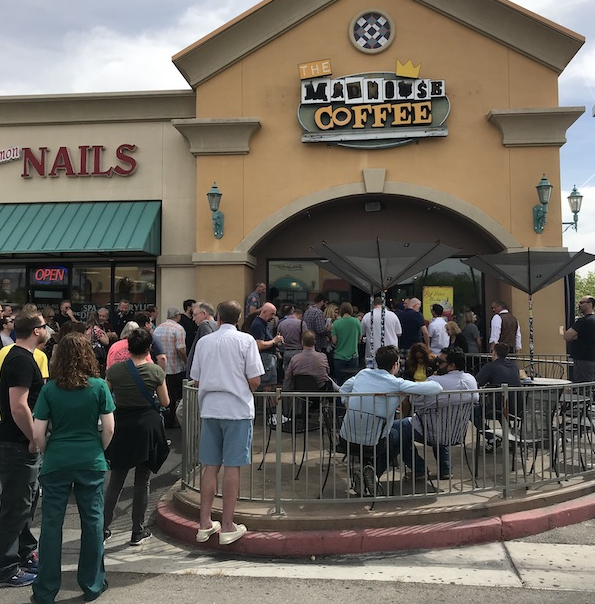

(Photo by Hector Luis Alamo/Latino Rebels)
The Madhouse sits just off the corner of Desert Inn Road and Durango Drive in The Lakes, a snazzy planned community on the west side of Las Vegas. When the developers were laying plans for The Lakes back in the ’80s, the dream was to build a pair of man-made lakes, hence the name. But they only managed to dig one, so today The Lakes only has one lake, Lake Sahara, sprawled out like a flattened octopus in the middle of mini-mansions. The Lakes used to be home to Citicorp’s credit-card payment processing center. Then, when the Great Recession hit and made Vegas the “Epicenter of the Housing Bust,” the center switched to processing mortgage payments. All the workers were sent home in 2014.
The crowd gathered at the Madhouse looked like the decent, comfortably middle-class people that most of us only see on network TV: a lot of colorful eyeglass frames and crafted beards, women with frizzy grey hair, retired hippies and Silicon Valley hopefuls. You have to think there were at least a few financiers and start-up entrepreneurs mixed in, too. Obviously they were liberals, but something about the large poster hanging inside the café, showing the colorful silhouettes of the 50 states rearranged in the form of an assault rifle, made me think they weren’t the Bernie kind of liberals. These had to be Hillary liberals, the war-and-money kind. And most of them didn’t seem to know much more about Mayor Pete than the people at Veterans Village. The words “Rhodes scholar,” “Harvard,” “Oxford” and “young” were thrown around a lot.
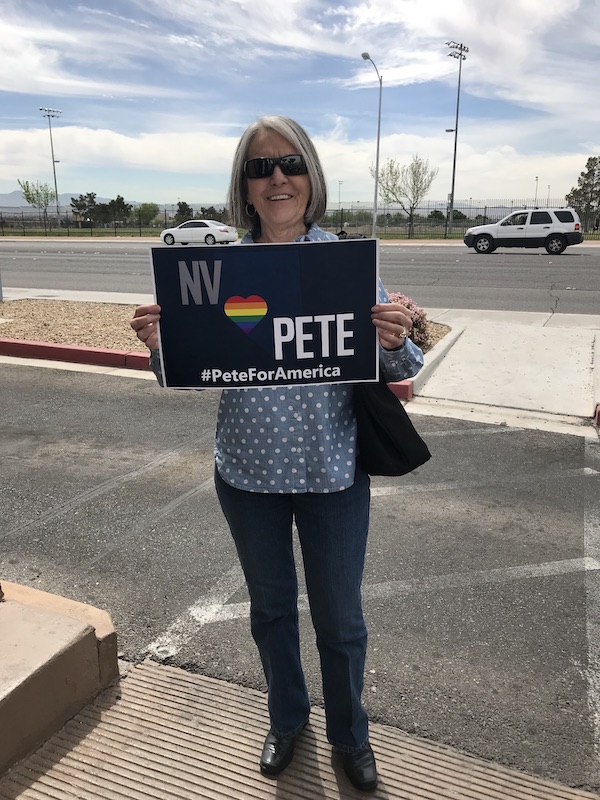

A Mayor Peter supporter (Photo by Hector Luis Alamo/Latino Rebels)
Mayor Pete is the son of Notre Dame professors who went on to Harvard, graduating Phi Beta Kappa, then on to Oxford as a Rhodes scholar, graduating with first-class honors, then on to McKinsey where he worked as a management consultant, before coming back home to South Bend and becoming its mayor at the age of 29. He also signed up for the Navy Reserves in 2009 and deployed to Afghanistan in 2014 for seven months as an intelligence officer—while he was still mayor of South Bend.
“I’m just looking for the next Barack Obama!” a grey-haired man told a grey-haired woman inside the coffeehouse.
There was a guy in a red MAGA hat, a Trump t-shirt and camo cargo shorts holding a neon sign that read PETE BUTTIGIEG WOLF IN SHEEP’S CLOTHING. (“I have no idea what he’s referring to,” an old woman had said back inside the Madhouse.) I realize now that the guy must have dropped a brick in his shorts when he saw me walking his way, my black shades on and black everything. He didn’t say or do anything but watch me coming toward him.


(Photo by Hector Luis Alamo/Latino Rebels)
“Hey, man,” I said, to put him at ease. “I couldn’t help noticing your sign.”
“Yeah, this guy’s a fake!”
What makes you say that?
“He pretends to have some conservative values… He isn’t really running for president… This is all about money… Look at this park.” He pointed at a huge park across the street, more a big green rolling field than a park. “Why is he having his rally in this tiny place instead of the park?… He has an elite education but then pretends to be dumb. Did you see him in the CNN town hall? He never gives a straight answer… Hillary thought we were stupid! She just wiped her server with a rag! Did she think we were stupid?… This is all about race! And identity politics… He’s not really religious.”
I asked him what conservative values Pete pretends to have, but that apparently confused him. So I moved on to simpler questions.
What made you vote for Trump?
“He’s isn’t a politician! And he can’t be bought.” A big smile oozed across his lips. “He can’t be bought.”
Are you happy with the way things are going with the economy?
“Of course,” he said confidently. “You know, the stock market’s up, employment, you know, employment is down…”
So what’s the most important thing for you in this upcoming election?
“Well, the wall, of course. We need to get it done.”
The whole thing? From Tijuana to Texas?
“Well, you know, there are natural barriers. So we don’t really need a wall in those places.”
Are you worried about Trump facing Bernie?
“Are you kidding? Bernie’s a socialist! He even admits it! Trump’s gonna wipe the floor with him! Same with this guy.” He smiled, pointing at the crowd of liberals gathered outside the Madhouse. “He claims to be a Christian and this folksy guy from a rural place, but he’s such a hypocrite! Trump’s gonna wipe the floor with him.”
So who are you afraid of seeing up against Trump?
“Honestly? Kamala Harris.”
Why’s that?
“Well, cuz she’s a black woman, and she’s a woman. So Trump’s could have a hard time with her.”
Mayor Pete’s big black shiny Escalade creeped through the parking lot, stopping a safe distance away from the crowd. As soon as Pete climbed out the back, my old Trump pal picked up his bullhorn and started chanting, “Hey, hey! Ho, ho! Pete the Sneak has got to go!… Hey, hey! Ho, ho! Pete the Sneak has got to go!” and kept up his chant for the next half hour or longer. While Pete, still standing out by the truck, was talking to reporters with their microphones pointing at him, the crowd standing outside the Madhouse cheered loud and long in hopes of drowning out the taunts.
Connecting With the Crowd
You should’ve seen the faces once Pete had satisfied the press in the parking lot and made his way over to the crowd. They were blushing like schoolgirls, men and women, most of them at least a solid decade older than Pete. You would’ve thought they were shaking hands with someone from Hollywood. Once Pete had left them wanting more, he made his way into the Madhouse and a surge of reporters and camerapeople and whoever else rushed through the doors, desperate for a spot inside. The rest quickly realized there was no way everybody was getting inside that coffeehouse to hear the speech Pete’s been giving pretty consistently ever since he announced he was exploring the idea of running for president back in January, four days before his dad passed away.
(Papa Buttigieg was from Malta, by the way — Buttigieg translates to something like “king of the turkeys”— and he was a Gramsci and Joyce scholar as well. I know the Joyce part means a lot to Pete: Shortest Way Home, the title of Pete’s new book, is a line from Ulysses, and Pete’s book is filled with a ton of Joycean bits. I’m hoping the Gramsci part still means something to Pete, too, though he could have since rebelled against his father in that way, like how a lot of second-wave feminists gave birth to girls who grew up to despise their mothers’ radical beliefs, get married, stay at home, and have lots of babies.)
Once the crowd outside the Madhouse realized they weren’t getting in to hear Pete, people began worrying aloud, “I hope they have a microphone in there so we can hear what he says. Why did he have his rally at such a tiny space to begin with?”
Later on, there was some commotion over by the Trumpist on the sidewalk. A huge fat guy in a red dress shirt tucked into his black dress pants was holding the side of his face and crying out, “Ow! Ow! You hit me! You hit me with your sign! Call the police! Call the police!” He dropped down on one huge knee, but when no one did or said anything to back him up, he got up cool as a baby elephant getting up from a mud-bath and strutted up to the Trumpist, looking like he would’ve choked the guy out in his massive arms had no one been there to catch it on Facebook Live.
“Just ignore him!” some nice lady pleaded.
“That was the mistake last time,” someone muttered. “We just ignored them, and look what happened. But still, the man’s got rights.”
After about 40 minutes, people began shuffling out the Madhouse door like they were leaving Sunday service, a vague content painted on their faces. One old lady clutching Pete’s book to her chest looked like she had just sat in with the Dalai Lama. The Trump guy, of course, renewed his chanting with fresh passion. “Hey, hey! Ho, ho! Pete the Sneak has got to go! Hey, hey! Ho, ho!” A young bearded reporter was barking at a young camerawoman in French, I guess telling her to make sure she got the shot; both were wearing low-top Converses with no socks.
Pete told the reporters and cameras that he was encouraged by the turnout, that it showed his message was resonating with voters, that his campaign has come up with a game plan and they plan on sticking to it—the usual politician talk. He thanked everybody for showing up. Then he climbed back into the big black SUV and took off for his meeting with the poor people on the other side of town.
Can Mayor Pete Do It?
If Mayor Pete is serious about being president, if he isn’t just running to earn himself some name-recognition so he can score a more high-profile job, then he has five problems, four of them not that serious.
First, few people I have met have been able to successfully pull off pronouncing Mayor Pete’s last name. It’s Buttigieg, like BOOT-edge-edge. Americans are notoriously awful at pronouncing any name or word that is even remotely foreign. Even a lot of perfectly English words get butchered, usually fancy words or words you sometimes see written but never hear spoken. There’s a theory somewhere that a person’s name is their destiny, the idea being that people like Washington, Jefferson, Hamilton, Napoleon, Lincoln, Roosevelt, Kennedy, and even Obama, were somehow destined for greatness at birth, or had fate heavily in their favor. There might be something to that. Quick: Think of a famous person from history whose name you can’t pronounce or spell. See what I mean?
Second, Mayor Pete is married to a handsome young man, which is only an issue with the people who don’t realize that what happens in someone else’s bedroom isn’t their business and has nothing to do with how well that person does his or her job.
Pete’s third minor problem is that he’s young, only 37, which has a lot of people wondering how wise it is to put a Millennial, albeit an older one, in charge of the richest, most powerful country in the world. But now that the country has a 72-year-old president who’s reliving his terrible twos, age shouldn’t really be an issue.
Pete’s last minor problem is that he is the mayor of a small town in northern Indiana, and no one has made the leap from a Mayor’s Office to the Oval Office in a single bound. But Mayor Pete doesn’t worry about what has or hasn’t happened before. “You could be a senior senator and have never managed more than a hundred people in your life,” he told The Washington Post. “I not only have more years of government experience than the president of the United States, but I have more years of executive experience than the vice president of the United States, and more wartime experience than anybody who arrived in the office since George H.W. Bush. As cheeky as it sounds coming from the youngest guy in the conversation, I think experience is one of the things that qualifies me to have a seat at the table.”
There isn’t much to argue with there. Still, being the mayor of a small town means Pete has only had to deal with small-town problems, which makes it very presumptuous of Mayor Pete to think he can go from running South Bend, Indiana, population 102,000, to running something as large and complicated as the United States of America. But I’m no Harvard grad, Rhodes scholar or McKinsey alum, so what do I know.
Mayor Pete’s main problem is that his privileged upbringing and experiences have left him somewhat oblivious to the plight of large sections of the American people, specifically blacks and Latinos. You hardly hear about them in Pete’s 300-and-something-page autobiography. You don’t even hear much about the poor people of South Bend, period. Pete tells us about all the abandoned factories and shuttered storefronts left over from South Bend’s heyday, but the shattered lives and families hardly get a mention.
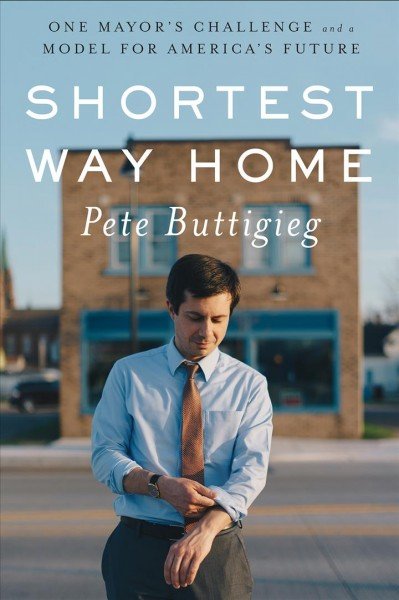

Having read his new book, I can say that Pete seems like a nice guy, and he’s a damn good writer. (Some sections, especially the ones about campaigning in Iowa and being in the Navy Reserves, are almost Orwellian, in the good sense.) I think Pete’s heart is in the right place, and he means well. But his brand of elite liberalism tends to overlook the realities of the little guy. He knows about the lives of the poor and working classes mostly through statistics and charts, and when his stats and charts say this or that action will be better for people, he tends to charge full steam ahead.
When Mayor Pete was looking for ways to bring trash-collecting rates down, he found that switching to automated garbage trucks would do the trick. But the fancy new trucks meant the city wouldn’t need so many garbage workers. So Mayor Pete had a decision to make:
Buying the technology was only worth it if we were prepared to eliminate the jobs. It wasn’t an easy thing to do, because our solid waste workers were likable and hardworking. In the end I decided to go ahead, because the city could offer the workers other jobs, provided they earned a commercial driver’s license. Half the affected workers did so, and half left city employment altogether.
Pete doesn’t say where that other half found jobs. But the city bought the new trucks and cut costs. So problem solved.
Saving South Bend?
Mayor Pete is going around the country saying he saved South Bend from oblivion, but there are stories that what he mostly did was begin its gentrification, by kicking the poor and low-skilled people out and bringing in richer, more higher-skilled people. That was pretty much Mayor Rahm Emaunel’s plan for Chicago: get rid of the unproductive poor people, who don’t bring in much tax income for City Hall, and invite rich people who could start businesses and add more to the City’s coffers. Mayor Pete even pushed for the creation of tax increment financing districts for funding development projects in South Bend—just like Mayor Rahm did in Chicago. But, as Ben Joravsky at the Chicago Reader has been laying out for the past several years, TIF is basically a scam, a slush fund by which Rahm takes money from the poorer neighborhoods of the South and West Sides and invests it in pet projects on the North Side and Downtown.
People are quick to call Mayor Pete the new Obama, substituting “gay” for “black,” and comparing Shortest Way Home to Dreams From My Father. It’s easy to remember everything Obama was and did as president, especially now that we have to watch a bloated orange fly around on Air Force One. But it’s just as easy to forget everything Obama wasn’t and didn’t do during his eight years in office. He pulled the economy from complete collapse, but only by bailing out Wall Street and leaving the rest of us with the bill. He won the Nobel Peace Prize in his first year, but then went on to deport more immigrants and launch more drone strikes than any president before him. He oversaw the increasing privatization of education through charter schools, and patted Mayor Bloomberg on the back while NYPD was stopping-and-frisking over four million New Yorkers, mostly Black and Latino. He provided over 25 million people healthcare coverage, but only by letting the insurance industry design a healthcare system first thought up by the Heritage Foundation and first adopted by Mitt Romney in Massachusetts.
Just ask Professor Cornel West if what America needs is another Obama:
The age of Barack Obama may have been our last chance to break from our neoliberal soulcraft. We are rooted in market-driven brands that shun integrity and profit-driven policies that trump public goods. Our “post-integrity” and “post-truth” world is suffocated by entertaining brands and money-making activities that have little or nothing to do with truth, integrity or the long-term survival of the planet. We are witnessing the postmodern version of the full-scale gangsterization of the world.
The reign of Obama did not produce the nightmare of Donald Trump—but it did contribute to it. And those Obama cheerleaders who refused to make him accountable bear some responsibility.
In that same essay for The Guardian, Professor West brings up the issue of character. Character is the X factor in the Mayor Pete presidential equation. We know he’s smart, talented and hard-working. We know he can study his ass off and get good grades. But where exactly does Mayor Pete stand on the spectrum from Skid Row to Main Street to Wall Street? When the chips are down, whose side is he on? Is he with the garbage workers or with lowering costs?
That isn’t to say Mayor Pete doesn’t have the right character to be president, only that we don’t know enough about him to be sure either way. And privilege isn’t a bad thing, so long as it doesn’t blind you to the suffering and struggles of the underprivileged. Still, there are plenty of privileged people who know all about the suffering of others —they read the papers every morning— and they still don’t care that much. Privilege creates enough distance to not care. Half the city’s garbage workers are out of a job, but if the mayor doesn’t actually know any garbage workers personally, then what’s it to him? Residents on the poor part of town are being forced out of their homes so the City can build stores and cafés and incubation centers for young, college-educated entrepreneurs, but those poor folks aren’t the mayor’s people—the young, college-educated entrepreneurs are.
“All politics is local,” goes a famous saying, but “the personal is political,” goes another. A mayor only need worry about staying in with the right people, the power-holders, to make sure he has enough political capital to push through his (their) agenda, and enough votes to keep him in office. The poor and working-class rarely vote anyway.
Don’t Be Too Quick to Judge
But Professor Marisel Moreno at Notre Dame tells me I shouldn’t be too quick to judge Mayor Pete. The Professor teaches “community-based learning courses” at La Casa de Amistad, a non-profit in South Bend’s predominately black and Latino West Side. She’s also a board member there. “Since Mayor Pete took office,” she writes in an email:
He met with people in the neighborhood, listened to their concerns, and made it one of his priorities to help the Latina/o neighborhood by investing funds to improve sidewalks, repave streets, put new lamp posts, make the area more pedestrian friendly, and beautifying it. I believe that local small business owners on Western Avenue —the main street of the West Side— were also helped financially (not sure about the details) or given incentives to improve their businesses. Because of all the improvements to an area of the city that had been virtually ignored for decades by previous governments, businesses are thriving today. There are many examples: Tortillería El Sol will soon be moving and expanding, and Heladería La Rosita had a great re-opening a few years ago where Mayor Pete cut the ribbon (if I remember correctly). He’s very popular among Latinos here, because he has shown he cares.
More importantly, he has denounced cruel immigration policies, and has spoken about the need to welcome immigrants to our city, and to help those who want to legalize their status. Among other things, he supported the South Bend ID program —which would have never happened under a Republican mayor— which provides an alternative form of identification to vulnerable populations (undocumented). Mayor Pete has been an ally of Latina/os in this city, and I expect that he’ll continue to be wherever else he goes.
I hear what the Professor is saying. And nearly everything I’ve seen and read about Mayor Pete seems too good to be true, even exciting. The first time I actually heard what Mayor Pete has to say was when he showed up on Real Time with Bill Maher two Fridays ago. Pete said all the right things, without even stuttering or measuring out his words the way Obama annoyingly does. Sure, he looks like The Elf on the Shelf in a blue tie, but I agreed with everything Pete said in that interview. In fact, I’ve agreed with everything I’ve seen or heard him say in all of my scouring since then. Pete seems to always say the perfect thing in the perfect way, the honest, passionate, and straightforward way we Millennials have been demanding from the people running this country.
In my mind I think Mayor Pete is an impressive guy, and in my heart I’m hoping he becomes president someday. But something in my gut just doesn’t trust him. It isn’t that he’s white or gay or graduated from Harvard and Oxford—though that last part might have a little to do with it. I don’t know. There’s just something about Mayor Pete that I can’t quite put my finger on. Maybe I’m being paranoid. But I have a hard time believing that a guy like that truly cares about lumpens like me, or my brother, or my sister, or my mother, or my father.
My wife, on the other hand, is 31 and a junior executive at a company headquartered here in Las Vegas, so I’m sure Mayor Pete cares about her plenty.
Later at the Village
Back at Veterans Village II, the lady who showed me where the repurposed shipping containers will go is telling what she thinks about Mayor Pete. “I think he’s awesome… He actually listens… He’s what we need —try this, if doesn’t work, try that— instead of all this badgering on each other.” Meanwhile, Mayor Pete has just wrapped up his interview with the greyhead from CNBC, who is steady watching Pete pack up his uneaten potato chips and sandwich so he can eat them on his way to the airport, or at least not throw them away in front of these poor people lining up for free food. His campaign staffers are telling Pete they got to get to the airport. But first, more questions from the young journos, who have been sitting around chatting and checking their phones.
A young blonde gushes as she tosses Pete a question about housing. Pete takes a big slow swing. “We have to do something about the wait lists for public housing,” he says. Then there’s another question about veterans, and another swing from Pete. “Veterans have a special connection to the concept of America.”
“Okay, two more questions,” says Pete’s female handler.
It’s my turn, I guess. I ask the obvious question, one I’ve yet to hear anyone pose to Pete.”You’re here in Nevada, which obviously has a large Latino immigrant population. What would you do differently about the situation at the border than what our current president is doing? And what do you think needs to be done with Central America and Mexico to help the situation?”
“We would do everything different,” Pete says, smirking out the side of his mouth like he tends to do. He also tends to talk out the side of his mouth, too. “Trump is splitting families at the border… Cutting aid to the region is counterintuitive… We need to partner with Mexico to help us… We could also start by passing the DREAM Act… We know what we need to do… Fixing our broken immigration system… I come from a community benefited by immigration.”
Well played, Mayor Pete. Another perfect answer.
I hope you prove my gut wrong.
***
Hector Luis Alamo is the Editor and Publisher of ENCLAVE and host of the Remember the Show! podcast. He tweets from @HectorLuisAlamo.



“Mayor Pete is going around the country saying he saved South Bend from oblivion, but there are stories that what he mostly did was begin its gentrification, by kicking the poor and low-skilled people out and bringing in richer, more higher-skilled people.”
The first article linked shows that actually gentrification began in 2008, 4 years before Pete Buttigieg took office.
Nowhere in the second article it is said that Pete Buttigieg was “kicking the poor and low-skilled people out and bringing in richer, more higher-skilled people”.
This incredibly irresponsible.
You said something in your gut makes you distrust Pete Buttigieg. I know what it is. It’s called bias and prejudice.
[…] is literally around the corner from The MadHouse Coffee, where I came to see the South Bend mayor Pete Buttigieg speak almost a year […]